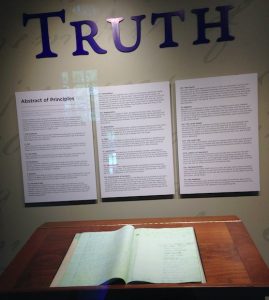Could it be said that “the Sandy Creek/Charleston tension brings out the best in everybody?”
Perhaps that could be said, if ever there were any theological tension between those two groups. A narrative has arisen to say that the Sandy Creek stream of Baptists believed in the moral ability of unregenerate men to respond to the gospel, conditional election, and that they denied God’s effectual grace for the salvation of His chosen people.
The Principles of Faith of the Sandy Creek Association, however, say otherwise:
III. That Adam fell from his original state of purity, and that his sin is imputed to his posterity; that human nature is corrupt, and that man, of his own free will and ability, is impotent to regain the state in which he was primarily placed.
IV. We believe in election from eternity, effectual calling by the Holy Spirit of God, and justification in his sight only by the imputation of Christ’s righteousness. And we believe that they who are thus elected, effectually called, and justified, will persevere through grace to the end, that none of them be lost.
These articles of faith are thoroughly Calvinistic, growing out of the old federal theology of our English Baptist forebears. The Calvinistic Baptist John Gano, from the Charleston stream, said that the Separate Baptists of Sandy Creek had “the root of the matter,” meaning that they had a biblical doctrine of conversion and a theology to support it. According to biographer Terry Wolever, Gano “did not see so much of a doctrinal problem with the Separates” and that “he reflected the general sentiment of the Particular Baptists towards the Separates” (The Life and Ministry of John Gano 304).
Dr. Paige Patterson has acknowledged the tendency to overstate the case when distinguishing between the Sandy Creek and Charleston traditions. In his dialogue on election with Dr. Al Mohler at the 2006 Southern Baptist Convention’s Pastors’ Conference, Patterson said, “The Sandy Creek tradition was … less Calvinistic, though, to be perfectly fair about the whole matter, it was certainly a long way from being Arminian, because the Sandy Creek statement of faith has a very Calvinistic strain to it also.”
It seems there never was any soteriological “tension” between these two great traditions of Baptist life.

































